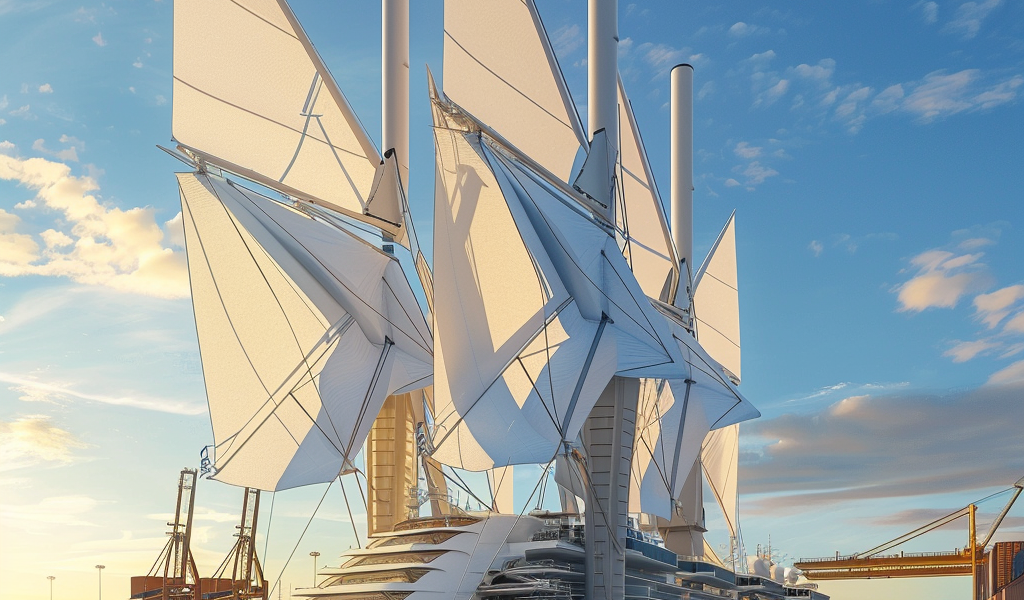Canopée Makes Historic First U.S. Port Call at Port Canaveral
In a groundbreaking event for the maritime industry, the MV Canopée, recognized as the world’s first hybrid propulsion commercial cargo vessel, docked at Port Canaveral, Florida, on September 2, 2024. This visit marks the vessel’s inaugural entry into the United States, showcasing innovative technology and vital support for space exploration.
Canopée embarked on its journey from France on August 19, making a brief stop in Bremen, Germany, on August 22 before arriving in Florida. The primary mission of this voyage was to deliver the European Service Module (ESM-3), a crucial component for NASA’s Artemis-III mission scheduled for launch in September 2026. The ESM-3 module will play a pivotal role in humanity’s return to the Moon, reinforcing the collaborative efforts between NASA and the European Space Agency (ESA).
Upon arrival, the offloading of the cargo was expertly managed by Ambassador Services International, ensuring a seamless transfer to the Kennedy Space Center. Following its successful delivery, Canopée departed for Belgium on September 4, continuing its commitment to supporting space exploration initiatives.
Capt. John Murray, CEO of Port Canaveral, expressed enthusiasm about welcoming Canopée, stating, “Port Canaveral was thrilled to welcome the MV Canopée on its first visit to the U.S. and proud to support NASA and their European Space Agency partners as they prepare for a historic return to the Moon. The design and purpose of this sail-assisted commercial vessel is unique for the maritime transport sector in both innovation and the type of cargo it carries for space exploration.”
Constructed at Neptune Shipyard in Poland, Canopée underwent its initial sea trials in December 2022, with the installation of its advanced wing sails completed in 2023. These sails, developed by AYRO, stand over 120 feet tall and encompass a surface area of 363 square meters. The innovative design features two flaps—one at the front and one at the rear—allowing for a dynamic adjustment of the sails’ angle relative to the wind. This capability enables the rear flap to pivot around the secondary mast, creating a camber that enhances performance.
One of the most significant advantages of Canopée’s wing sails is their collapsibility, which contributes to operational flexibility. The vessel’s design allows for a remarkable fuel consumption reduction of up to 30 percent, highlighting its role in promoting sustainability within the maritime sector.
As a roll-on/roll-off (Ro-Ro) vessel, Canopée is specifically engineered to accommodate cargo related to space programs, demonstrating its unique capabilities within the industry. With a deadweight tonnage of 5,500, the vessel measures 400 feet in length and is registered in France, operated by Alizes. The vessel’s design was conceived by ArianeGroup, positioning it as a trailblazer for future wind-assisted propulsion vessels.
The arrival of Canopée at Port Canaveral signifies more than just a successful delivery; it represents a pivotal moment in the evolution of maritime transport, particularly in the context of supporting ambitious space exploration missions. As the industry continues to innovate and embrace sustainable practices, Canopée stands as a testament to the potential of hybrid propulsion technology and the future of cargo shipping.
In recent years, the maritime sector has increasingly focused on reducing its carbon footprint, and vessels like Canopée are at the forefront of this movement. By integrating wind-assisted propulsion into commercial operations, the industry is taking significant strides toward achieving greater environmental responsibility while maintaining efficiency and effectiveness in cargo transport.
The collaboration between maritime transport and space exploration is poised to grow, with Canopée leading the charge. As nations and organizations unite in their quest to explore beyond Earth, the role of innovative vessels will become increasingly vital, ensuring that essential components reach their destinations safely and efficiently.
The successful completion of Canopée’s first U.S. port call is a significant milestone in the ongoing relationship between maritime transport and space exploration, setting the stage for future advancements and collaborations that will shape the future of both industries.





